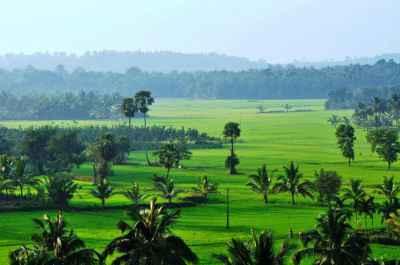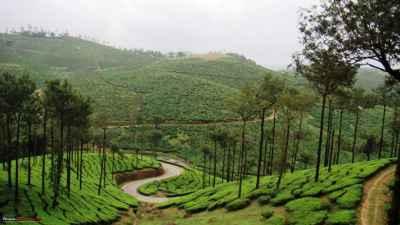Kerala’s Ayurvedic Cuisine: Meals for Wellness
Kerala, located on the southwestern coast of India, is not only renowned for its picturesque landscapes and beautiful backwaters, but also for its unique and traditional Ayurvedic cuisine. Ayurveda, which translates to “science of life,†is an ancient system of medicine that promotes overall well-being and focuses on maintaining a balance between the mind, body, and spirit. Kerala, often referred to as the birthplace of Ayurveda, has a rich history and strong cultural connection to this holistic healing practice.
One of the key aspects of Ayurveda is the belief that food is medicine. The Ayurvedic cuisine of Kerala is designed to nourish the body, promote digestion, and balance the doshas (vata, pitta, and kapha) that govern our physical and mental constitution. It incorporates a wide variety of fresh and seasonal ingredients, herbs, spices, and cooking techniques that are believed to have therapeutic properties.
Key Features of Kerala’s Ayurvedic Cuisine
Kerala’s Ayurvedic cuisine has several key features that set it apart from other regional cuisines in India:
- Use of Fresh and Organic Ingredients: Ayurvedic cooking emphasizes the use of fresh, seasonal, and locally sourced ingredients. Organic produce, such as fruits, vegetables, and grains, is preferred as it is believed to have higher nutrient content and promotes overall health.
- Herbs and Spices: Ayurvedic cuisine relies heavily on the use of herbs and spices, which not only enhance the flavor of the food but also have medicinal properties. Commonly used spices include turmeric, cumin, coriander, ginger, and cardamom, among others.
- Customization: Ayurvedic meals are tailored to an individual's specific needs and dosha imbalances. The cooking methods and ingredients may vary based on one's body type and health condition.
- Balanced and Nutritious: The Ayurvedic cuisine of Kerala aims to provide a balanced meal that includes all the essential nutrients. It typically consists of a variety of grains, legumes, vegetables, dairy products, and oils to ensure a well-rounded and nourishing diet.
- Lightly Spiced and Digestible: Ayurvedic meals are often lightly spiced and cooked in a way that aids digestion. This includes methods such as steaming, boiling, and sautéing with minimal oil.
Ayurvedic Thali
Ayurvedic thali, a traditional platter-style meal, is a popular way to experience the diverse flavors and health benefits of Kerala’s Ayurvedic cuisine. A typical Ayurvedic thali consists of a variety of dishes, each serving a specific purpose in promoting balance and wellness:
- Rice: Rice is the staple grain of Kerala, and it is often served as the main component of the thali. It provides energy and acts as a base for other dishes.
- Sambar: Sambar is a lentil-based stew that is infused with a variety of vegetables and spices. It is rich in protein, fiber, and essential nutrients.
- Rasam: Rasam is a tangy soup made with tamarind, tomatoes, and a blend of spices. It aids digestion and is known for its detoxifying properties.
- Thorans and Pachadis: Thorans are dry vegetable dishes made with grated coconut, while pachadis are yogurt-based preparations with vegetables or fruits. These dishes provide a balance of flavors and textures.
- Avial: Avial is a mixed vegetable curry that is cooked with a coconut-based gravy. It is a delicious and nutrient-rich addition to the thali.
- Payasam: Payasam, a sweet dish made with rice, jaggery, and milk, is often served as a dessert to complete the thali. It adds a touch of indulgence to the meal.
Health Benefits of Ayurvedic Cuisine
The Ayurvedic cuisine of Kerala is more than just delicious food; it offers numerous health benefits as well:
- Improves Digestion: The use of herbs, spices, and specific cooking techniques in Ayurvedic cuisine aids digestion and promotes a healthy gut.
- Enhances Immunity: The inclusion of immune-boosting ingredients, such as turmeric and ginger, helps strengthen the body's immune system.
- Detoxifies the Body: Several ingredients used in Ayurvedic cooking, such as cumin and coriander, have detoxifying properties that help eliminate toxins from the body.
- Supports Weight Management: Ayurvedic meals are designed to provide essential nutrients while keeping the calorie intake in check, making it beneficial for weight management.
- Promotes Overall Well-being: The balanced and nourishing nature of Ayurvedic cuisine contributes to an overall sense of well-being, both physically and mentally.
Where to Experience Ayurvedic Cuisine in Kerala
Kerala offers a range of options to experience authentic Ayurvedic cuisine:
- Ayurvedic Resorts: Several resorts in Kerala specialize in Ayurvedic treatments and offer Ayurvedic meals as part of their wellness packages. These resorts often have experienced Ayurvedic chefs who prepare meals according to individual requirements.
- Ayurvedic Restaurants: In major cities and tourist destinations, you can find restaurants that serve Ayurvedic cuisine. These restaurants offer a variety of Ayurvedic dishes to choose from.
- Cooking Classes: Some Ayurvedic centers and resorts offer cooking classes where you can learn to prepare Ayurvedic meals under the guidance of trained chefs. This is a great way to understand the principles and techniques behind Ayurvedic cooking.
Conclusion
Kerala’s Ayurvedic cuisine offers a unique blend of flavors, nutrition, and wellness. It is a culinary journey that not only satisfies your taste buds but also promotes good health and balance. The use of fresh ingredients, herbs, spices, and specific cooking techniques makes Ayurvedic cuisine a holistic and nourishing experience. So, the next time you visit Kerala, don't miss the opportunity to indulge in the flavors and benefits of this ancient culinary tradition.
Share this post:
Encourage readers to share this blog post on social media platforms to spread awareness about Kerala’s Ayurvedic cuisine and its benefits.
Disclaimer : The information provided in this blog is for general informational purposes only. While we strive to keep the content accurate and updated, TravelSetu assumes no liability for errors or omissions. If you believe any part of this blog infringes your rights or causes concern, please notify us immediately at info[at]travelsetu[dot]com so that appropriate action can be taken.























